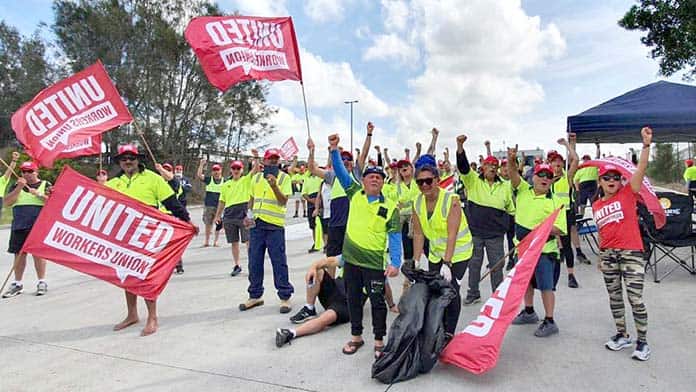More than 350 workers at the Smeaton Grange Coles distribution centre in Sydney staged a legal 24 hour strike last week—and were immediately locked out by the company for three months in response. They now face the prospect of going without pay over Christmas and the New Year.
“There’s some fear and anxiety, there’s people with families, partners who both work here that will now have no income”, one Coles worker told Solidarity. “But it has also emboldened a lot of us. We’re not going back until we get what we want.”
Workers at the distribution centre are striking for certainty over their futures and to have their voices heard, with automation in 2023 set to result in the closure of the centre.
The workers want an increase in redundancy pay with five weeks’ pay for each year of service capped at 104 weeks, for anyone sacked prior to the centre’s closure, not just those made redundant when it closes. There is concern that, without this, the company could terminate people early in order to reduce their redundancy payout.
They “are fighting for the right to have a job,” according to United Workers Union (UWU) Logistics Director Matt Toner. Workers also want pathways for redeployment at Coles’ new warehouses and a shift in the casual to permanent ratio to guarantee 80 per cent of jobs at the centre are permanent roles.
Coles are building new automated warehouses but have refused to offer positions there to any of the workers at Smeaton Grange, despite some of the staff having 30 years’ experience with the company. The outcome of bargaining at the centre will set a benchmark for closure arrangements at Coles’ two other distribution centres in NSW also closing at Goulburn and Eastern Creek, as well as others in Queensland.
“We worked throughout the bushfires and through COVID. When people were stockpiling at supermarkets we worked around the clock. We’re just asking for a reasonable redundancy package,” one worker said.
Instead Coles are focused to maximise profits at the expense of their workers. Coles has posted record profits during the pandemic, “Workers want a just transition,” said Mr. Toner, “For many [workers] nearing the end of their working lives, finding another job will be difficult and finding another full-time permanent job could be impossible. Coles has a responsibility to workers that have given so much.”
Coles management notified workers of the lockout via email only two hours after strike action began. The email, from Distribution Centre Manager, Joseph Fernandopulle, told workers, “During the period of the lockout, team members are directed not to work, and are not required to attend or perform any work, for Coles. Team members will not be paid for the duration of the lockout”, which, according to management won’t end until 11 February 2021, “unless otherwise advised.”
Coles chief operating officer Matthew Swindells told ABC that temporarily shutting the Smeaton Grange distribution centre was designed, “to protect Christmas…we won’t have our customers’ Christmas lunch held ransom”.
But one of the locked out workers told Solidarity, “Coles CEO Steve Cain was given a 29.8 per cent increase in his pay, to around $7 million a year, yet our requests for a decent redundancy package are considered unreasonable. We’re determined to keep on fighting until Coles comes up with an acceptable package.”
The workers have received widepsread community support, with local businesses and community members showing their solidarity by donating supplies such as water and food to the striking workers.
A spokesperson from Coles said, “we have made alternative arrangements for products ordinarily distributed from the Smeaton Grange distribution centre.”
But according to one worker, “We’re the largest shed in NSW and don’t see how the company can function properly without our 350-odd workforce. They’ve got another two pop up sheds but their other two permanent centres are already at full capacity and struggling to meet demand.”
Coles have also been covertly shifting merchandise and machinery, including forklifts, to other sites to allow it to keep operating during the strike and lockout at Smeaton Grange.
Picketing to shut down its replacement centres could force a quick end to the dispute by forcing the company to the table. Workers have begun holding short protests at the pop up centres—but seriously disrupting Coles’ operations will require sustained picketing in defiance of the law to stop trucks leaving.
Solidarity action by the workers at these centres could also help cripple Coles’ distribution capacity over the busy Christmas period.
Spreading the strike is the only way to guarantee workers win certainty about their futures and aren’t left without pay over Christmas.
By Niko Kricket and James Supple






